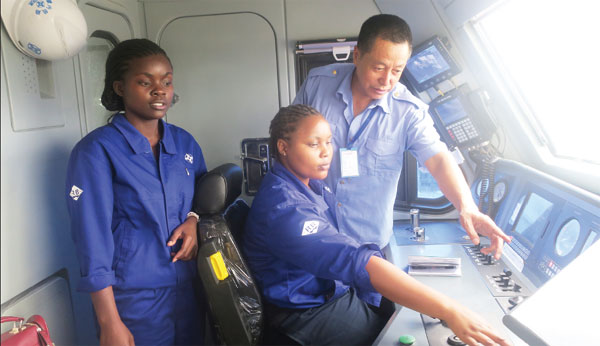They're ready for the driver's seat
By Lucie Morangi (China Daily Africa) Updated: 2017-05-07 14:23Chinese language skills, enthusiasm earn Kenyan women a place among pioneer operators of modern locomotives
A passion for the Chinese language and willingness to learn new skills are qualities that have paid off for Shalom Njeri and Elizabeth Wanjala. They are part of a group of seven women who have been sponsored by the builders of Kenya's Standard Gauge Railway to undertake locomotive driving courses in China and be part of the first team to control the modern engines.
China Daily caught up with them during a scheduled test run. The two were part of a six-team crew that took a new locomotive for a 40-minute spin on the new tracks, ready for the official launch at the end of this month. The train traveled from Nairobi South passenger station to Sultan Hamud and back.
|
Elizabeth Wanjala (left) and Shalom Njeri with their instructor when taking the locomotives on a test run. Lucy Morangi / China Daily |
Njeri, 24, has a bachelor of education degree from Kenyatta University. Two years after enrolling for her program, she started language lessons at the Confucius Institute. She soon excelled in her exams and was offered a scholarship to China for another six months to practice the language.
Her experiences in China strengthened her determination to pursue the Chinese language and culture as a career. Her aim was to be among the first group of teachers employed by the government to implement the new national curriculum, which is taking the Chinese language to elementary schools. After graduation, she was sent again to China to refine her skills, and it was there that she received a call from home informing her of new opportunities offered by China Road and Bridges Corp, which was constructing the SGR.
"Distance did nothing to water down my excitement. While in China, I immediately contacted the head of the recruitment team in Nairobi and expressed my interest and mentioned my proficiency in Mandarin. It was a surreal feeling to later receive a phone call telling me that I had made the cut, and soon after I joined the team at China's Baoji Railway Technical College.
"I think we were a class of around 40 students, with 33 males and only seven female drivers," adds Wanjala, who has two bachelor's degrees, in marketing and Chinese and communications, under herself.
She put in her application during a careers fair at her university.
"I am really not sure of the criteria they used, but I believe passion and willingness to learn new things were at the top of their list," she says.
The driver trainees were in China for about three months and are now back in Kenya for their practical lessons. Theory lessons are still ongoing, while practicals are undertaken under the keen eye of their trainer and professional locomotive drivers. It may take three years of training to graduate.
"Two people are always required in the cabin at any one time, and that is the driver and his assistant," says Njeri.
The driver is guided by a monitor that indicates the required speeds, depending on the track gradient. This means that most of the time, the driver is preoccupied, and thus the assistant is there to keep an eye on the tracks stretching ahead.
"Everything is automated, and thus the driver is guided every step of the way. The assistant is the eyes of the driver and will call out if there is an obstruction ahead. This does not mean that the driver cannot also watch the tracks, but two sets of eyes are just much better," says Wanjala.
The train is expected to reach speeds of up to 120 kilometers per hour.
The women have gone through many lessons, including light diesel engine maintenance. Safety checks are the first thing to be done before the engines are started.
"Safety is paramount, and we are required to check everything before we set off. Even if it takes two hours, it is better than endangering passengers' lives later," says Njeri.
She says the job demands discipline and great patience.
"Kenyans expect the SGR to be a game changer, especially in terms of keeping time. We therefore have to be time-conscious and meet these expectations. Locomotive drivers have to communicate with a lot of people, including the dispatcher who communicates their itinerary and the switchman who directs where to stop the engine to ensure easy access to the carriages or freight.
"We are ready to steer the new train into the future," says Njeri, as Wanjala beams by her side.
The modern infrastructure project is expected to be officially opened by President Uhuru Kenyatta on June 1.
lucymorangi@chinadaily.com.cn
- 'Cooperation is complementary'
- Worldwide manhunt nets 50th fugitive
- China-Japan meet seeks cooperation
- Agency ensuring natural gas supply
- Global manhunt sees China catch its 50th fugitive
- Call for 'Red Boat Spirit' a noble goal, official says
- China 'open to world' of foreign talent
- Free trade studies agreed on as Li meets with Canadian PM Trudeau
- Emojis on austerity rules from top anti-graft authority go viral
- Xi: All aboard internet express












